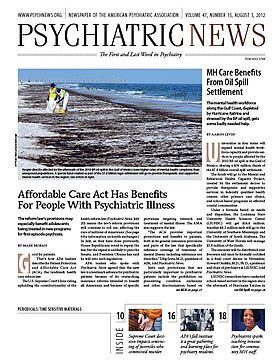“Wer eine Reise tut, der hat was zu erzaehlen.” As this Austrian saying proclaims, those who travel have a story to tell.
Three years ago, I decided to go on my journey of a lifetime. I started psychiatry residency training in the United States and became one of the many residents referred to as “international medical graduates” (IMGs). IMGs are defined as physicians who did not attend medical school in the United States. We account for approximately 40 percent of psychiatry residents and fill critical gaps in the U.S. physician workforce, both as trainees and practitioners, particularly in underserved areas. This has been the case for many years, and, given the projections for physician shortages, the number of international graduates may increase in the near future.
Debate surrounding IMGs often focuses on the impact of physician migration from lower-income countries and the hurdles they encounter overcoming cultural and linguistic barriers (with prejudice and discrimination sometimes being part of the mix), but seldom focuses on strategies that foster integration and success of IMG physicians. While my journey has not been without challenges, it also has been one of great opportunities.
Efforts to further integration and reduce disparities between IMGs and graduates of U.S. medical schools vary considerably among residency programs, but valuable support for all residents is offered by APA. I found the Resident’s Guide to Surviving Psychiatric Training to be my Lonely Planet guide; it outlines fundamentals of psychiatry training and includes a chapter specifically for IMGs.
In addition, a course designed to help IMGs adapt to psychiatric practice in the United States has become a cornerstone of APA’s annual meeting, and I encourage all residents to attend the meeting and seek out that course.
My district branch has been a reliable tour guide as well, ensuring that in my journey I would not miss the many attractions organized psychiatry has to offer. District branches are wonderful resources that provide mentorship and networking opportunities outside of residency programs. Also, APA offers fellowships that allow residents, including IMGs, to get actively involved in organized psychiatry and to develop leadership and research skills.
APA has also shown its commitment to helping IMGs in the policy area. For example, IMGs were recognized as one of seven minority/underrepresented groups (M/UR) and gained representation in the APA Assembly in 1994. earlier this year, a position on the Board of Trustees specifically designated for an M/UR trustee was created. In addition, APA has issued a position statement condemning discrimination against physicians based on the country in which they received medical education, opposed restrictions on the number of international graduates entering graduate medical training, and more recently expressed concern to the National Residency Matching Program that its policy changes may unintentionally increase disparities for IMGs.
While the efforts made are commendable, we continue to confront additional barriers, and numerous opportunities remain elusive. For example, noncitizens remain ineligible for training grants from the National Institutes of Health and for APA research fellowships, which are instrumental in facilitating the transition from trainee to established physician-scientist. This is clearly a missed opportunity, as many talented physicians seek U.S. training not only to refine their clinical skills, but also to engage in cutting-edge research for which few opportunities exist in their home countries.
Another policy change adversely impacting training opportunities for us is under consideration by the Accreditation Council for Graduate Medical education (ACGME). A proposed “Common Program Requirement” would significantly limit admission of IMGs to ACGME-accredited training programs. Among other problems, it would effectively eliminate the option for IMGs to pursue a fellowship in the United States without having completed an ACGME-accredited residency first. As a professional society with a longstanding track record of fighting disparities, and tireless members who are actively engaged in advocacy, APA is in a great position to help eliminate barriers that limit training opportunities and integration in the U.S. medical care system. All of the IMGs who are APA members could benefit by our organization’s taking a stance against this new, discriminatory requirement.
In a country that was built by immigrants, the presence of IMGs should be seen as enriching the U.S. medical system. We make an important contribution to the workforce, but much can still be done to facilitate integration. By improving supportive strategies and creating opportunities to hone our skills or develop new ones, APA can foster an environment in which all physicians in our increasingly diverse workforce can make meaningful clinical and scientific contributions.

Nina Kraguljac, M.D., is a PGY-4 resident at the University of Alabama at Birmingham and in May completed a two-year term representing Area 5 on the Assembly Committee of Members-in-Training.

